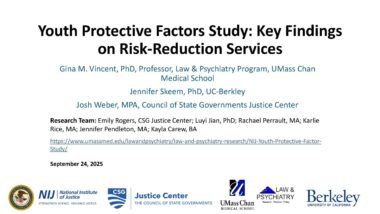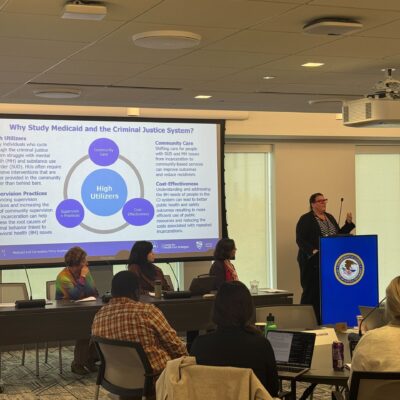Youth Protective Factors Study: Key Findings on Risk-Reduction Services
Hosted by The Council of State Governments (CSG) Justice Center, iSPARC at UMass Chan Medical School, and UC Berkeley’s Risk-Resilience Lab
The Youth Protective Factors Study Effective Supervision and Services Based on Risks, Strengths, and Development is an unprecedented multistate, multiyear examination of the risk and protective factors that most influence reoffending—particularly serious offenses that involve physical harm to others—among youth ages 10 to 23 in the juvenile justice system.
This webinar is the third in a series and covers newly released findings from the study, including detailed service and outcome tracking for thousands of justice-involved youth across three states.
Participants will learn:
- What risk factors best predict long-term, serious reoffending—particularly for violent offenses
- The type and intensity of services that youth receive and whether these services—particularly the use of risk-reduction services—align with research and best practices for reducing reoffending
- Strategies to improve supervision, services, and the efficient use of resources to protect public safety and improve youth outcomes
This webinar is intended for juvenile justice professionals, policymakers, and community leaders.
Speakers:
- Josh Weber, Deputy Division Director, Corrections and Reentry, CSG Justice Center
- Gina Vincent, Professor of Psychiatry (Psychology) and Co-Director of Law & Psychiatry Program, University of Massachusetts Chan Medical School, Implementation Science & Practice Advances Research Center (iSPARC)
- Jennifer Skeem, Professor of Social Welfare and Public Policy, University of California–Berkeley
Other Webinars in the Series:
Find other events
You might also be interested in
New Hampshire Department of Corrections Commissioner Helen Hanks presents at the Medicaid and Corrections Policy Academy in-person meeting.
Read MoreThe sharp rise in school shootings over the past 25 years has led school officials across the U.S.…
Read MoreIdeally, leaders would have actionable data readily available to them when they need it most. However, many agencies…
Read More





















